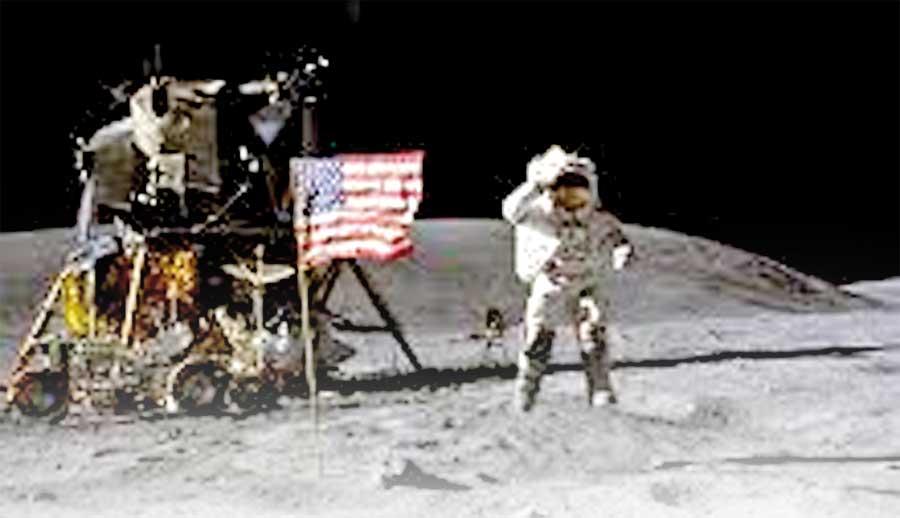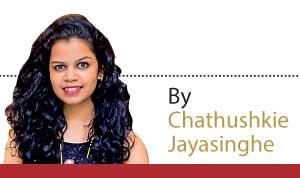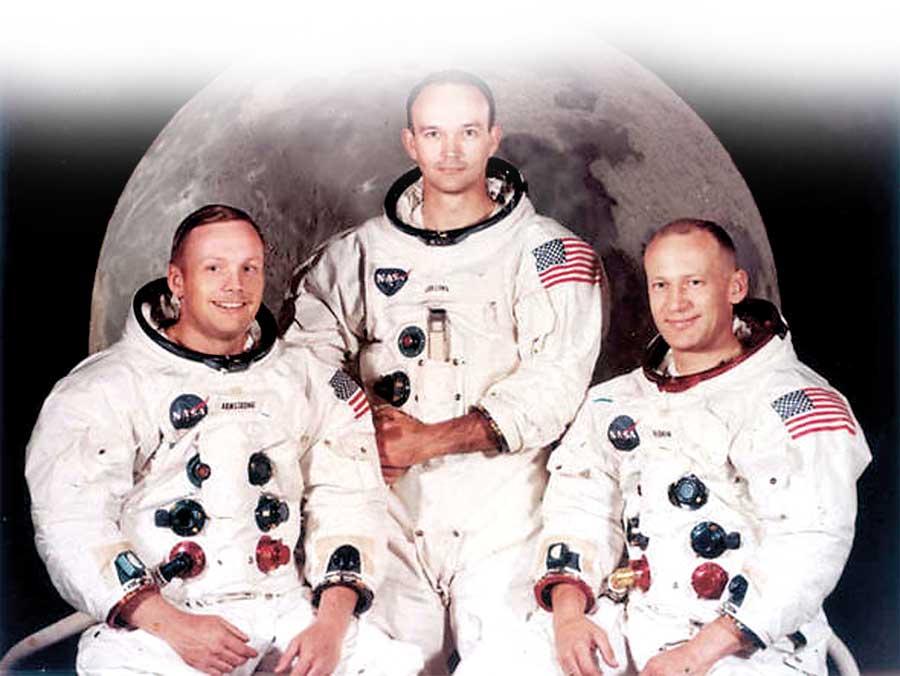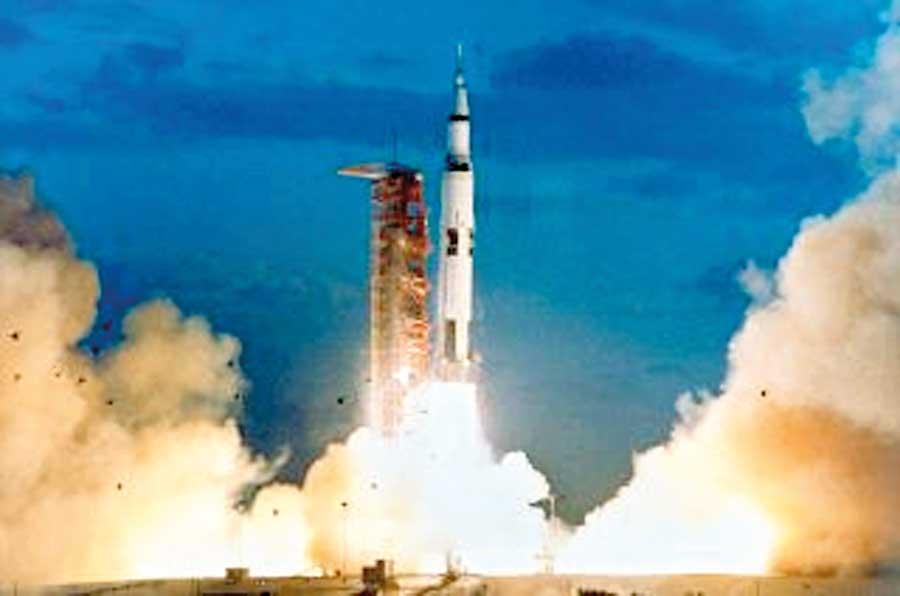Reply To:
Name - Reply Comment
Last Updated : 2024-04-26 02:12:00

It has been 50 years since the moon landing; a result of science, technology and competition between two superpowers of the time, Russia and the USA.
Evoking much excitement all around the world, the first historical step on the moon was taken by Neil Armstrong, on the 20th of July (21st in Sri Lankan time), 1969. He was accompanied on this journey by Edwin Aldrin and Michael Collins on the Apollo 11 spaceflight. 
This operation is defined up to date as “A milestone, a giant step forward for mankind.”
Since 1969, this has been a well-known tale of grandeur and accomplishment to the young and old alike. Yet, we are unaware of how it was embraced, viewed and interpreted by Sri Lankans back in the day and how it was projected through media in ways that retained the inquisitiveness of the Eastern readership.
It is safe to say that the enthusiasm and curiosity about the programme had sustained in the East as vigorously as in the West. This became visible to me through records of speeches that had been delivered at public halls such as the Lionel Wendt from professionals like Prof. Kurt R. Stelly, a member of the moon travel organizing committee.
Translations and extracts of these speeches had been catered to the public via media.
Proving that science was not a completely alien subject to the average brown man in the 60s, such articles had answered many questions that lay unknown to the public.
To name a few, the reasons for selecting the ocean in launching the vessel had been said to be diverse.
To reduce the effect of any technical difficulties, they had opted for the safety which the sea offers by covering 70% of the world. Another factor had been the absence of large strips of land in the USA as in Russia.
The reason for launching a rocket instead of a satellite had also been pondered upon. The lack of gravity in the moon (1/6th of Earth’s gravity) was calculated to obstruct the satellite’s approach. Besides, it would have been impossible to instantaneously transfer photographs taken by a satellite without manual assistance.
Hence the Apollo 11 was built to hold up to three individuals, by employing the latest technological expertise of the time.
"Taking a step further in making the discourse Sri Lankan, some articles had tried to give religious readings to this scientific achievement. Some had tried to connect it with the technological power that legendary Kings like Ravana had said to have possessed"
Through a detailed translation of Stelly’s speech by journalist Walter Jayawardene, it was clear that the readers had been offered a thorough account of the benefits of the moon landing.
Direct advantages had been things such as contentment gained by succeeding the previously impossible, the ability to observe the Earth from a close distance and bringing back a soil sample from the moon for further experiments. Indirect benefits had had long term effects; the automated self-checkup systems developed for the astronauts, inventions like the telephone box and other machinery needed for the journey had in turn paved the way to improve the communication and health sectors of the world. Similarly, knowledge of climate change and meteorology had increased with the numerous experiments conducted for this journey.
With a newly gained predictability of climate change, fields such as agricultural industry, fisheries industry and the world economy as a whole had rocketed sky-high. Since experiments on space travel had been mostly conducted under the sea, the scope in studying the deep waters too had massively improved. Lengthy articles explaining all these minute details had covered several newspapers of its July editions in 1969.

The Ceylon Observer had given a countdown and a range of pictures and details captioned “Exclusive to the Observer from the New York Times Service.”
The Daily Mirror (OLD) had published a series of articles named “Space and You.” Proud headlines declaring that Arthur C. Clarke, a Sri Lankan resident, was the first to predict the need of a space station, a Sinhala poem titled Sanda Athi Lowa by Upali Keerthi Siri published in Sri Lankadeepaya and numerous sci-fi short stories built around the moon landing didn’t fail to catch my eye.
The articles had taken an interesting turn with the return of the heroes to earth. In celebration, picture galleries and biographies of the three dignitaries had been displayed on the front covers. Picturesque posters had taken up full pages. Discourses on the possibility of life on other planets, the future steps to be taken with regards to space travel, discussions on civilization and agricultural possibilities on the moon had been plastered across pages.
Doubts on the authenticity of the landing had already started taking form, where they had suggested checking for the occurrence of earthquakes on the moon through the equipment that Armstrong fixed on his landing.
"Since 1969, this has been a well-known tale of grandeur and accomplishment to the young and old alike. Yet, we are unaware of how it was embraced, viewed and interpreted by Sri Lankans back in the day and how it was projected through media in ways that retained the inquisitiveness of the Eastern readership"
Taking a step further in making the discourse Sri Lankan, some articles had tried to give religious readings to this scientific achievement. Some had tried to connect it with the technological power that legendary Kings like Ravana had said to have possessed.
Astrologers had travelled to the extent of marketing their advertisements stressing on how the moon landing may affect the people. It is amusing how the safe return of the three men had been accredited to the positioning of their lucky stars.
Coming back to the present, these recordings of history are without a doubt invaluable in a time where enthusiasm for space travel among world economies seems to lag. In our oriental perspective, with accordance to our beliefs, even the most average Sri Lankan had been exposed to ways of decoding Science and understanding this marvel of achievement.
It is necessary to say that the role media has played in it is astounding and exceptionally significant.


Add comment
Comments will be edited (grammar, spelling and slang) and authorized at the discretion of Daily Mirror online. The website also has the right not to publish selected comments.
Reply To:
Name - Reply Comment
US authorities are currently reviewing the manifest of every cargo aboard MV
On March 26, a couple arriving from Thailand was arrested with 88 live animal
According to villagers from Naula-Moragolla out of 105 families 80 can afford
Is the situation in Sri Lanka so grim that locals harbour hope that they coul